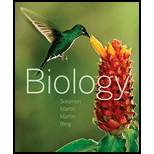
Biology (MindTap Course List)
11th Edition
ISBN: 9781337392938
Author: Eldra Solomon, Charles Martin, Diana W. Martin, Linda R. Berg
Publisher: Cengage Learning
expand_more
expand_more
format_list_bulleted
Concept explainers
Textbook Question
Chapter 31, Problem 6TYU
An open circulatory system (a) is characteristic of squids and other active mollusks (b) permits contracting muscles to recover quickly (c) has no blood vessels (d) is a unique characteristic of annelids (e) has hemolymph, which bathes tissues directly
Expert Solution & Answer
Want to see the full answer?
Check out a sample textbook solution
Students have asked these similar questions
Based on phylogeny and history of evolution, do new anatomical features such as lungs (amphibians) arise de novo or came from pre-existing structures of their ancestors (like gills of fish)? Explain.
Essay on (2 pages): Dogfish sharks (Squalus acanthias) represented “primitive” gnathostomes and cats (Felis catus) represented the “derived” state. Was this appropriate? How does the anatomy of a cat reflect humans’ shared ancestry with sharks?
If nematodes are the most numerous animals, the Arthropoda, including insects, are the most diverse, accounting for more than half of all known animal species. What features have led to the remarkable evolutionary success of this branch?
Chapter 31 Solutions
Biology (MindTap Course List)
Ch. 31.1 - Prob. 1LOCh. 31.1 - Prob. 2LOCh. 31.1 - Prob. 3LOCh. 31.1 - connect What is the significance of choanocytes in...Ch. 31.1 - Prob. 2CCh. 31.1 - VISUALIZE Sketch the major events of the life...Ch. 31.1 - Prob. 4CCh. 31.2 - Prob. 4LOCh. 31.2 - Prob. 5LOCh. 31.2 - Prob. 6LO
Ch. 31.2 - Prob. 7LOCh. 31.2 - Prob. 8LOCh. 31.2 - What are some advantages of cephalization and a...Ch. 31.2 - On what basis have biologists classified...Ch. 31.2 - Prob. 3CCh. 31.2 - Prob. 4CCh. 31.3 - Prob. 9LOCh. 31.3 - Prob. 10LOCh. 31.3 - Describe six key characteristics of arthropods,...Ch. 31.3 - Prob. 12LOCh. 31.3 - Prob. 1CCh. 31.3 - Describe four key arthropod characteristics, and...Ch. 31.3 - Prob. 3CCh. 31.3 - Describe four adaptations that have contributed to...Ch. 31 - Prob. 1TYUCh. 31 - Prob. 2TYUCh. 31 - Which of the following is associated with the...Ch. 31 - Trochophore larvae are characteristic of (a)...Ch. 31 - Prob. 5TYUCh. 31 - An open circulatory system (a) is characteristic...Ch. 31 - Which of the following characteristics is...Ch. 31 - Trilobites (a) were early mollusks (b) are...Ch. 31 - Prob. 9TYUCh. 31 - Prob. 10TYUCh. 31 - The correct sequence of complete metamorphosis of...Ch. 31 - Test Your Understanding 12. VISUALIZE Draw a cross...Ch. 31 - Prob. 13TYUCh. 31 - Prob. 14TYUCh. 31 - INTERPRET DATA Imagine that you discover a new...Ch. 31 - Prob. 16TYUCh. 31 - Prob. 17TYUCh. 31 - Prob. 18TYUCh. 31 - SCIENCE, TECHNOLOGY, AND SOCIETY international...
Knowledge Booster
Learn more about
Need a deep-dive on the concept behind this application? Look no further. Learn more about this topic, biology and related others by exploring similar questions and additional content below.Similar questions
- Sponges and cnidarians have no lungs or gills. How do they exchange gases with the environment? Are humans better off having lungs? If so, how?arrow_forwardWhat are the problems that vertebrates needed to solve to adapt to the terrestrial environment since they came from the aquatic habitat? How does evolution solved those problems?arrow_forwardhow did ancient fish make the evolutionary jump from gills to lungsarrow_forward
- First with body segmentation 1. Echinodermata2. Platyhelminthes3. Annelida4. Porifera5. Chordata6. Arthropoda7. Nematods8. Cnidaria9. Molluscaarrow_forwardWhich of the following classes of animals possess an aristotle's lantern feeding structure that is used for scraping up algae and other food items? -Class Ophiuroidea -Class Cephalaspidomorphi/Hyperoartia -Class Holothuroidea -Class Echinoidea -Class Asteroideaarrow_forwardTemnospondyl fossils show evidence of a lateral line system in the juveniles, but not in the adults. This suggests that ____. the juveniles relied on filter feeding while the adults did not the juveniles were aquatic whereas the adults were terrestrial the juveniles got most of their oxygen from cutaneous respiration whereas the adults did not the juveniles were terrestrial whereas the adults were aquaticarrow_forward
- what do fossils tell us about the evolutionary history of the animal kingdom?arrow_forwardYou take a field trip to tide pools in Puget Sound and encounter all sorts of Animals. Please use the following descriptions of those adult Animals to determine which of the 9 major phyla each belongs. Has radial symmetry and two tissue layers: ["cnidaria", "Mollusca", "Arthropoda", "Annelida", "Platyhelminthes", "Porifera"] Has 6 jointed appendages and a chitinous exoskeleton: ["cnidaria", "Mollusca", "Arthropoda", "Annelida", "Platyhelminthes", "Porifera"] Has bilateral symmetry with a digestive sac and no coelom: ["cnidaria", "Mollusca", "Arthropoda", "Nematoda", "Platyhelminthes", "Porifera"] Has bilateral symmetry, an open circulatory system, a digestive tube, gills and a radula: ["cnidaria", "Mollusca", "Arthropoda", "Nematoda", "Platyhelminthes", "Porifera"] Has no true tissues and no body symmetry: ["cnidaria", "Mollusca", "Arthropoda", "Nematoda", "Platyhelminthes", "Porifera"]arrow_forwardTest Your Understanding 6.Which of the following is not characteristic of birds? (a) hollow bones (b) amnion (c) ectothermy (d) high metabolic rate (e) reptilian-like scales on legsarrow_forward
arrow_back_ios
arrow_forward_ios
Recommended textbooks for you
 Biology (MindTap Course List)BiologyISBN:9781337392938Author:Eldra Solomon, Charles Martin, Diana W. Martin, Linda R. BergPublisher:Cengage Learning
Biology (MindTap Course List)BiologyISBN:9781337392938Author:Eldra Solomon, Charles Martin, Diana W. Martin, Linda R. BergPublisher:Cengage Learning

Biology (MindTap Course List)
Biology
ISBN:9781337392938
Author:Eldra Solomon, Charles Martin, Diana W. Martin, Linda R. Berg
Publisher:Cengage Learning
From Sea to Changing Sea | Early Life in the Oceans || Radcliffe Institute; Author: Harvard University;https://www.youtube.com/watch?v=Ac0TmDf5Feo;License: Standard youtube license